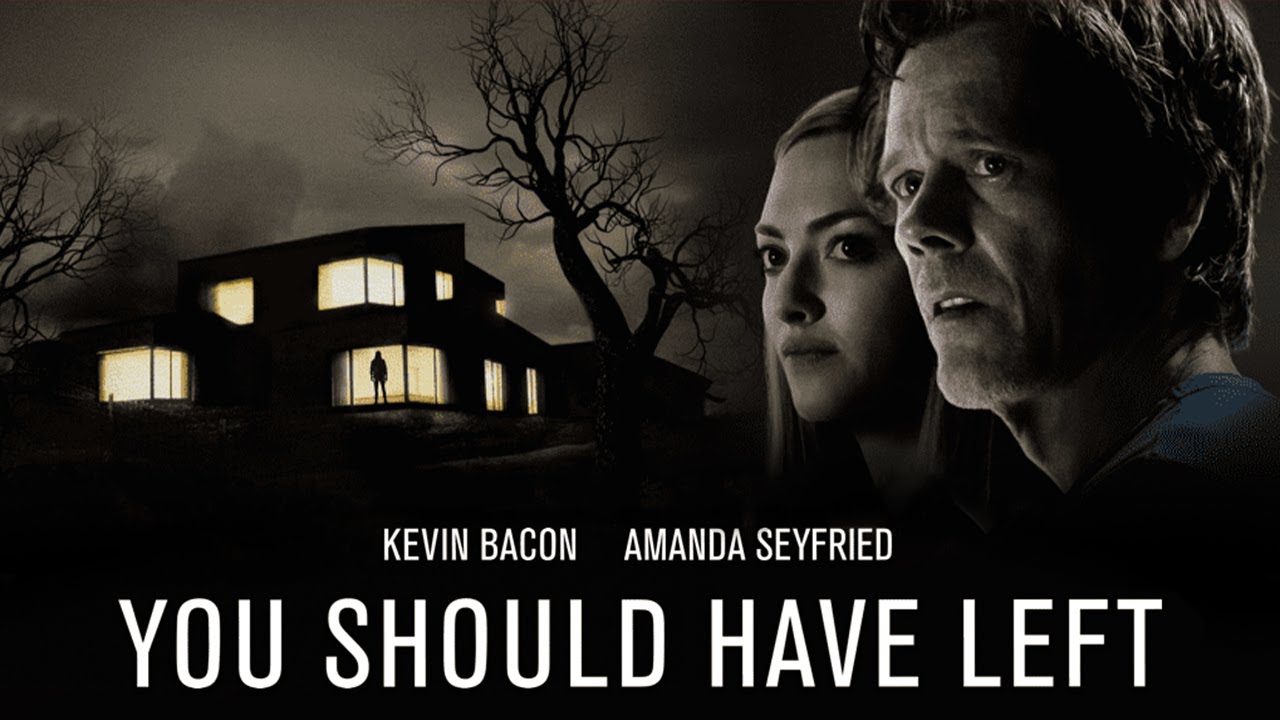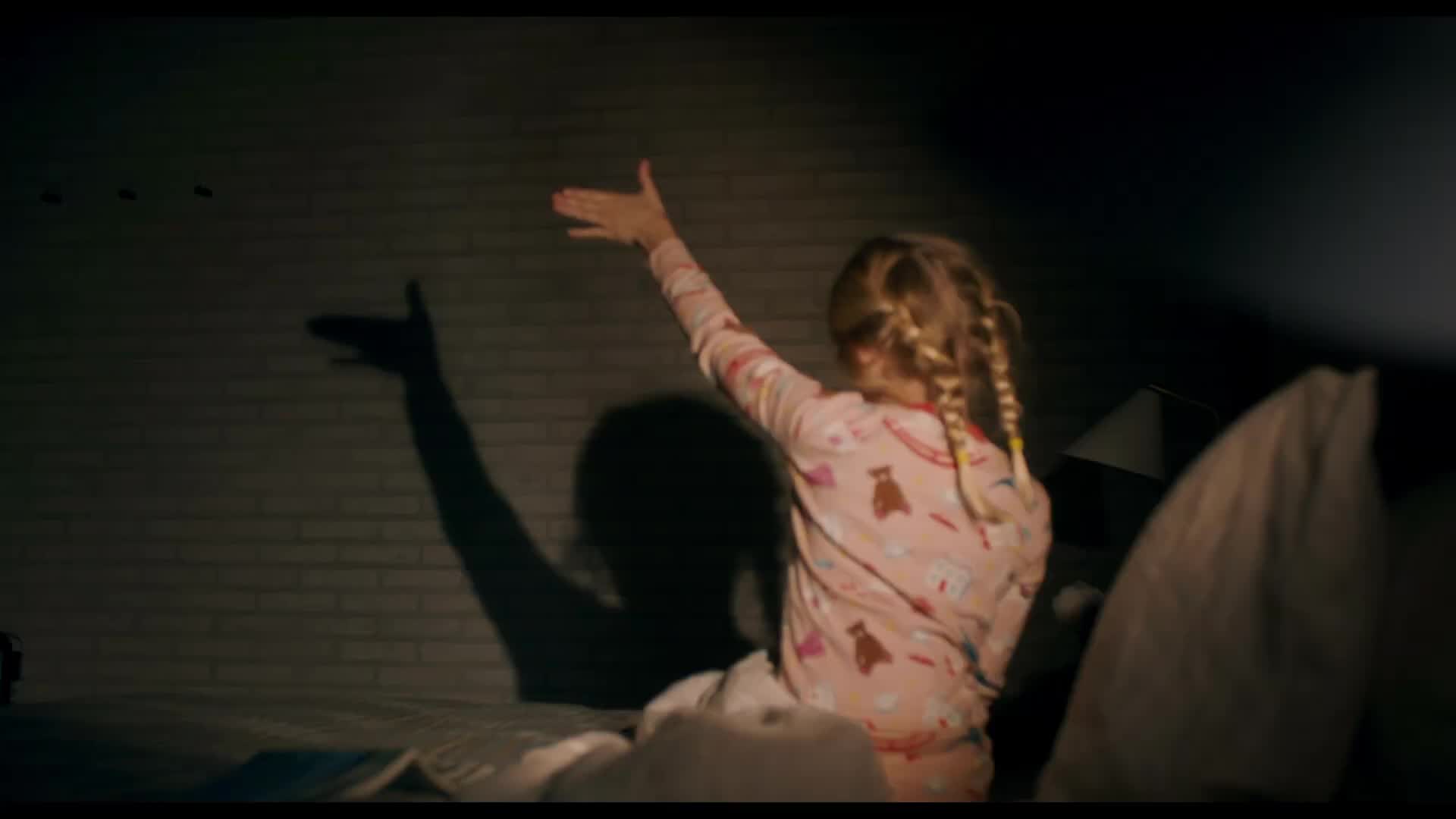You Should Have Left (2020)

You Should Have Left (2020) – A Psychological Thriller That Delves Into Fear, Regret, and Paranoia
Overview of the Film (Introduction)
Released in 2020, You Should Have Left is a psychological horror thriller directed by David Koepp. The movie stars Kevin Bacon, Amanda Seyfried, and Avery Tiiu Essex. Based on Daniel Kehlmann’s 2017 novel of the same name, the film offers a spine-chilling exploration of guilt, fear, and the psychological unraveling of its protagonist, a man struggling with his past mistakes and haunted by the ominous nature of his surroundings. The film blends elements of horror, suspense, and psychological drama, creating an unnerving atmosphere that keeps the audience guessing.
The plot centers around Theo Conroy (Kevin Bacon), a successful banker, who, along with his wife Susanna (Amanda Seyfried) and their young daughter Ella (Avery Tiiu Essex), decides to spend their summer vacation in a remote house located in the mountains. The house, designed with a minimalist approach, offers a picturesque view but hides a dark secret within its walls. As Theo grapples with the strained relationships in his family and his personal history, the house begins to take on a character of its own, amplifying his paranoia. It becomes clear that Theo’s past has caught up with him, and the house itself seems to reflect his mental state.
The film’s premise might seem simple, but it’s the execution and the layers of psychological tension that elevate You Should Have Left into an unsettling experience. With its eerie cinematography and haunting score, the movie successfully blurs the line between the supernatural and the psychological, making the audience question what’s real and what’s merely a figment of Theo’s fractured mind.
What to Expect: Thematic Elements and Psychological Intrigue
The primary draw of You Should Have Left lies in its psychological depth. Theo, the protagonist, is a man running away from his past, including his previous marriage and his troubled career. The film opens with him and his family arriving at the house, presenting a seemingly idyllic setting, but it doesn’t take long before the cracks in the facade begin to show. From the start, there’s a palpable tension that suggests not everything is as it seems. As the film progresses, this unease intensifies.
Theo’s character is crucial to the film’s success. Bacon’s portrayal of Theo is both captivating and unsettling. As an actor known for roles in thrillers, Bacon brings a subtle complexity to the character. Theo is not a typical villain or a simple man with a dark past; he is a person who is deeply aware of his failings, yet he is also a victim of his own insecurities. The tension between his past mistakes and his attempts at redemption serves as the emotional backbone of the movie.
Thematically, the film explores a number of intriguing concepts, primarily revolving around guilt, isolation, and fear. The house itself acts as a symbolic representation of Theo’s inner turmoil. It’s a place of supposed refuge, yet it quickly becomes a psychological prison, reflecting his anxieties, fears, and the weight of his mistakes. The house seems to shift and change with each passing moment, adding a sense of dread and paranoia that follows Theo throughout the film.
The relationship between Theo and his wife, Susanna, also adds a layer of emotional complexity. Their marriage is strained, and as the film delves deeper into their interactions, it becomes clear that their emotional distance is as much a part of the narrative as the supernatural events that unfold. Susanna’s role, played by Amanda Seyfried, is both supportive and, at times, distant, adding further depth to the film’s exploration of isolation—not just physically, but emotionally as well.
The House as a Character and the Supernatural Element
One of the most striking aspects of You Should Have Left is its use of the house as both a setting and a character. The architectural design of the house, created by the film’s production designers, is striking in its minimalism. It is stark, clean, and cold, a design choice that heightens the feeling of alienation and unease. The house, much like the protagonist, is hiding something—its strange layout, odd angles, and maze-like structure contribute to the sense that it is not merely a place of rest, but a manifestation of Theo’s disturbed mind.
The supernatural elements in the film are subtle but impactful. While the audience may initially think the house is haunted in the traditional sense, the film never fully commits to a supernatural explanation. Instead, it presents a series of inexplicable occurrences—rooms that shouldn’t exist, time loops, and objects that seem to shift and disappear. These elements work together to create an atmosphere of uncertainty and anxiety. The audience is never fully sure whether the supernatural elements are real or a result of Theo’s unraveling mind. This ambiguity is one of the film’s greatest strengths, as it allows the story to straddle the line between psychological thriller and horror.
The house’s impact on Theo is central to the plot, and as the movie progresses, his mental state deteriorates in tandem with the increasing strangeness of his environment. The house becomes both a literal and figurative prison, reinforcing the idea that Theo cannot escape from his past mistakes or his guilt. This is most evident in the film’s final act, where the house’s true nature is revealed in a climactic sequence that leaves the audience questioning the events that have unfolded.
The Climax and Conclusion: A Mind-Bending Revelation
The final act of You Should Have Left takes everything that’s been built in the previous two-thirds of the movie and turns it upside down. As Theo’s psychological state deteriorates, the audience is taken on a harrowing journey into his fractured mind. The film does not shy away from exploring the darker aspects of Theo’s character, nor does it provide easy answers. The tension culminates in a shocking revelation that redefines everything the audience thought they knew about the film.
Without giving away too much, the conclusion of the film is both satisfying and thought-provoking. It ties together the film’s various themes, offering a sense of closure while leaving enough ambiguity to keep the audience thinking long after the credits roll. The movie’s final moments are chilling in their emotional depth and psychological complexity, delivering a conclusion that feels both inevitable and shocking.
Ultimately, You Should Have Left is a film about the consequences of one’s actions, the inability to escape one’s past, and the terror that comes from within. It asks profound questions about memory, guilt, and the things that haunt us—both in our waking hours and in our dreams. With strong performances, a tense atmosphere, and a narrative that refuses to follow conventional horror tropes, You Should Have Left is a compelling and unsettling psychological thriller that lingers long after the screen goes dark.
Hashtags:
#YouShouldHaveLeft #PsychologicalThriller #KevinBacon #AmandaSeyfried #HorrorMovie #PsychologicalHorror #Suspense #GuiltAndFear #FilmReview #MustWatch
Related Movies:











